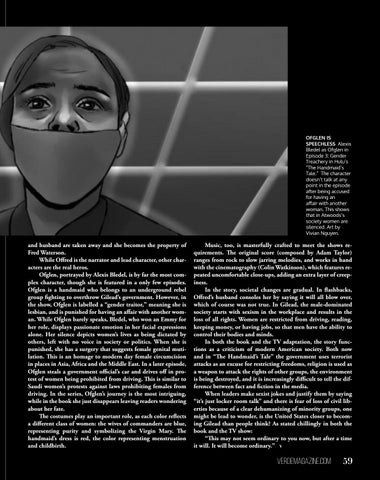OFGLEN IS SPEECHLESS Alexis Bledel as Ofglen in Episode 3: Gender Treachery in Hulu’s “The Handmaid’s Tale.” The character doesn’t talk at any point in the episode after being accused for having an affair with another woman. This shows that in Atwoods’s society women are silenced. Art by Vivian Nguyen.
and husband are taken away and she becomes the property of Fred Waterson. While Offred is the narrator and lead character, other characters are the real heros. Ofglen, portrayed by Alexis Bledel, is by far the most complex character, though she is featured in a only few episodes. Ofglen is a handmaid who belongs to an underground rebel group fighting to overthrow Gilead’s government. However, in the show, Ofglen is labelled a “gender traitor,” meaning she is lesbian, and is punished for having an affair with another woman. While Ofglen barely speaks, Bledel, who won an Emmy for her role, displays passionate emotion in her facial expressions alone. Her silence depicts women’s lives as being dictated by others, left with no voice in society or politics. When she is punished, she has a surgery that suggests female genital mutilation. This is an homage to modern day female circumcision in places in Asia, Africa and the Middle East. In a later episode, Ofglen steals a government official’s car and drives off in protest of women being prohibited from driving. This is similar to Saudi women’s protests against laws prohibiting females from driving. In the series, Ofglen’s journey is the most intriguing, while in the book she just disappears leaving readers wondering about her fate. The costumes play an important role, as each color reflects a different class of women: the wives of commanders are blue, representing purity and symbolizing the Virgin Mary. The handmaid’s dress is red, the color representing menstruation and childbirth.
Music, too, is masterfully crafted to meet the shows requirements. The original score (composed by Adam Taylor) ranges from rock to slow jarring melodies, and works in hand with the cinematography (Colin Watkinson), which features repeated uncomfortable close-ups, adding an extra layer of creepiness. In the story, societal changes are gradual. In flashbacks, Offred’s husband consoles her by saying it will all blow over, which of course was not true. In Gilead, the male-dominated society starts with sexism in the workplace and results in the loss of all rights. Women are restricted from driving, reading, keeping money, or having jobs, so that men have the ability to control their bodies and minds. In both the book and the TV adaptation, the story functions as a criticism of modern American society. Both now and in “The Handmaid’s Tale” the government uses terrorist attacks as an excuse for restricting freedoms, religion is used as a weapon to attack the rights of other groups, the environment is being destroyed, and it is increasingly difficult to tell the difference between fact and fiction in the media. When leaders make sexist jokes and justify them by saying “it’s just locker room talk” and there is fear of loss of civil liberties because of a clear dehumanizing of minority groups, one might be lead to wonder, is the United States closer to becoming Gilead than people think? As stated chillingly in both the book and the TV show: “This may not seem ordinary to you now, but after a time it will. It will become ordinary.” v
verdemagazine.com
59
